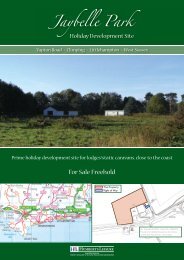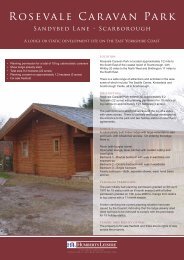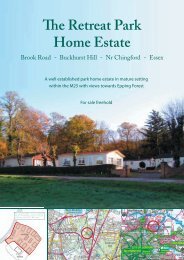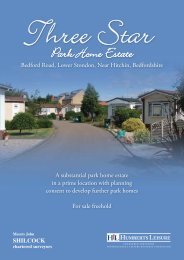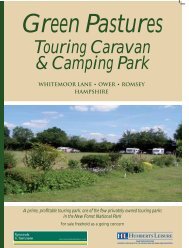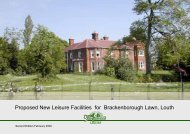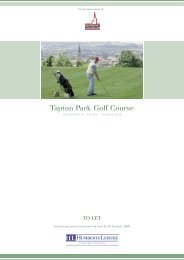Featured property - HLL Humberts Leisure
Featured property - HLL Humberts Leisure
Featured property - HLL Humberts Leisure
- No tags were found...
Create successful ePaper yourself
Turn your PDF publications into a flip-book with our unique Google optimized e-Paper software.
LegalAcquiring a<strong>Leisure</strong> PropertySome potential legal pitfallsfor the unwaryImagine the scenario – you’ve found the perfect building or site foryour new leisure business. The location is ideal and the survey andvaluation are satisfactory. The agents have negotiated a good rent forthe new lease or a good price for the freehold. For some operatorsthis is all they feel they need to know about their new <strong>property</strong> andthe role of the lawyers is regarded as little more than preparing theappropriate paperwork. Better advised operators, though, take a muchkeener interest in the legal due diligence side of the purchase process.They know that problems revealed in the due diligence can potentiallyrender even the best looking <strong>property</strong> worthless for their purpose.So what are the potential legal pitfalls to consider when purchasinga leisure <strong>property</strong>? The following are a selection of the key pointsthat should be considered at an early stage on a purchase:1. PlanningIs the proposed use for the <strong>property</strong> permitted by a planning consent?If not, then an application for change of use will usually be required.With some older properties, such as public houses where they havebeen used as such for many years there may not be an original planningpermission, although it may be prudent to obtain a Certificate ofLawful Use from the Local Authority. Remember that even if a<strong>property</strong> is currently being used for your intended use that does notnecessarily mean that the use is permitted under planning law. Theplanning authorities generally have ten years from the date of thechange of use to take enforcement proceedings for breach of planning.It is also important to consider any conditions contained in theplanning consent for the permitted use or the construction of thebuilding. For example, the permission may contain restrictions onthe hours of trading, car parking or the times that goods may bedelivered to the premises. Purchasers are often surprised to learnthat conditions contained in planning consents dating back tothe 1960s for example may still be enforceable. Again a planningauthority has up to ten years to prosecute a breach of a planningcondition from the date that the breach first occurs.For older properties also consider if Listed Building Consents havebeen obtained for works. Building regulations records should also besearched to check that alterations carried out to existing buildingswere duly certified. There is no time limit on a Local Authority’sability to bring enforcement proceedings for a breach of theregulations so it is advisable to obtain all completion certificates.Remember that planning will still be an issue even if you are takinga lease rather than acquiring the freehold of a <strong>property</strong> as a standardcommercial lease will require the tenant to comply with the planning laws.2. Restrictions on Use & Restrictive CovenantsEven if the proposed use is permitted under the planning regimethere may be covenants on the freehold title prohibiting this useor curtailing it. The freehold title should therefore be carefullyexamined prior to the purchase. Restrictive covenants preventinggambling and operating licensed premises are not uncommon andeven if they are very old they may still be enforceable as long as thebeneficiary of the covenant can be identified. Restrictive covenantsoften also prohibit noise and nuisance for the benefit of neighbouringowners and should be checked carefully in light of the proposed use.In more serious cases it may be advisable to obtain insurance againstthe enforcement of the covenant or a release of the covenant fromthe beneficiary before proceeding with the purchase.Commercial leases oblige the tenant to comply with restrictionson the freehold title so a prospective tenant must also investigatethe freehold title carefully. A tenant should also check the lease forprohibitions in it on noise and nuisance and other restrictions. Alsoconsider if the user clause in the lease permits a change of use and,if so, whether this is subject to landlord’s consent and if it is fullyqualified “such consent not to be unreasonably withheld”.3. Access & Ancillary RightsThe key consideration here is does the freehold title and/orthe lease grant the necessary rights for the proposed use of the<strong>property</strong>? In particular does the <strong>property</strong> adjoin the publichighway or is there a right of way over a private road betweenthe <strong>property</strong> and highway. If there is access over a private roadthen how is it maintained and who pays for its upkeep? Will thepurchaser be expected to contribute and if so how much?It is not uncommon for there to be a strip of land between the<strong>property</strong> and the highway with no evidence of any rights of way infavour of the <strong>property</strong> over this and no known owner. A commonland search is advisable in these circumstances. Possible ways ofreducing the risk in these circumstances may be to require theseller to provide a statutory declaration establishing a right of wayover the strip or taking out insurance.Also consider if all the car parking places are contained within the<strong>property</strong> or do rights need to be granted to access them?Rights of sewerage should also be considered for rural orremote properties.A leasehold purchaser should consider if the rights granted in thelease are adequate for its purposes and that the landlord can itselfgrant these rights based on an examination of the freehold title.30 Spring 2007








